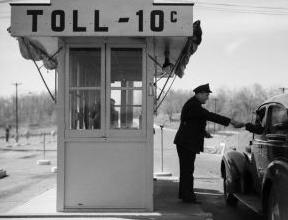The toll booths still stand forlornly at every parking lot entrance, with no one inside. The students and retirees who handed out your ticket when you arrived and received your payment when you left are either flipping hamburgers or working as Walmart greeters; minimum wage stand-up jobs without even cell phone music. They’ve been replaced by devices requiring the driver to stop, press a button, retrieve a ticket, and count to 30, hoping this time the bar will admit the car. The ticket machines are about five and a half feet off the ground; too high and too far away for a sport coupe; too low and close by for the increasingly gigantic SUVs, and either high, low, door-scraping or unreachable for sedans, depending on the manufacturer and model. The driver cannot just hop off as if a car were a motorcycle or a bike. The immediate problem is no room at all for an open door because the ticket machine is in the way.
Chimpanzees, with longer arms than most humans, would have an easier time of it. The impatient people in line behind wouldn’t be shouting the sort of epithets that come from the president’s tweets. The barrier blocking the parking lot rose the moment the person in the toll booth created the ticket. The waiting line moved smoothly and happily, but that was then. This is now.
Suppose you manage somehow to gauge the exact distance between the blocking arm to go forward and the precise number of centimeters between you and the car behind. That’s usually zero because that car is right on your bumper, ready to crush it the second you choose reverse. The honking and yelling begin even before you’re in position to open the door to get the ticket. The second major challenge happens at departure from the parking lot. The machine is averse to cash and will only accept credit cards. After inserting the ticket precisely as instructed, you’ll learn what you owe, but only if the parking lot is well lit. The bill is usually anything from seventy-five cents to six dollars. Assuming you accomplish all that perfectly the second time (which seldom happens), you find all those mini-amounts on your credit card. What could you have bought for seventy-five cents three weeks ago? Miss a single dollar-fifty cent payment and write a check for the astonishing interest in following month. The city, intending to save money on human employees, bought the high-tech machines, but far fewer people go shopping in town, so the stores they once patronized vanish into chapter eleven. The millions who prefer to shop in their pajamas don’t need to try on shoes before buying them. Everyone loses. Only the auto repair shops thrive.
Cell phones can sometimes be a nuisance; brazenly demanding attention anywhere and everywhere. You might be enjoying dinner in a restaurant with five friends and have a question. Ask it, and five people, all of whom have their cell phones instantly available on their bodies, will deliver the same response simultaneously.
The phones have become the ultimate authority, infallible and current to the nanosecond. They’re ending discussions, conversations, arguments and jokes, any of which might have been fun, or once was. Be quicker than Siri to blurt out an answer, and those five friends will check it. But before you blame cell phones for their trespasses, give them a chance to atone for closing shops, replacing newspapers, and waking people at dawn to read vicious tweets. Cell phones and their high-tech relatives can save the country from our current predicament.
Your cell phone can tell you exactly what the framers of our constitution meant according to The Constitution Society’s Jon Roland. Mr. Roland is a scholar who researched the 18th century meaning of “High crimes and Misdemeanors” and learned that the misunderstood phrase didn’t mean murder, manslaughter, or armed robbery. The word “high” had nothing to do with the degree of the crime, but was reserved for the position of the person committing it. “High” referred to public officials “who, because of their official status, are under special obligations that ordinary persons are not under”.
“Offenses of this kind survive today in The Uniform Code of Military Justice. It recognizes as punishable offenses such things as perjury of oath, refusal to obey orders, abuse of authority, dereliction of duty, failure to supervise, moral turpitude, and conduct unbecoming. They are offenses which bear on the subject’s fitness for the duties he holds, to which he is bound by oath or affirmation to perform.” Mr. Roland adds that the original, complete meaning of “perjury” was violation of an oath”, a discovery he made by searching An Elementary Latin Dictionary, published in 1895 by Charlton T. Lewis. So, is the Commander in Chief bound by the Uniform Code of Military Justice? And what about all those generals? If Mr. Roland is right, we should forgive cell phones for kidnapping an entire generation.






Be First to Comment